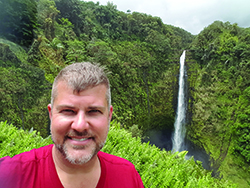Brain Tumor Survivor
Keep Communicating, Even Through Tears
 Three-time cancer survivor Richie Johnson’s perseverance is nothing short of amazing. After being treated for a brain tumor at seven years old, he faced two more brain tumor diagnoses and successful treatments at ages 37 and 41. He credits an incredible personal and professional support system with helping him get through his experiences.
Three-time cancer survivor Richie Johnson’s perseverance is nothing short of amazing. After being treated for a brain tumor at seven years old, he faced two more brain tumor diagnoses and successful treatments at ages 37 and 41. He credits an incredible personal and professional support system with helping him get through his experiences.
My journey with brain and central nervous system tumors began when I was seven years old. I’d started wetting the bed and having sleepless nights. My parents thought I was simply acting out, but when I started waking up screaming in pain, they took me to the doctor. Unfortunately, our primary care physician also believed it was a behavioral problem and refused to do any tests. My parents eventually took me to the hospital where diagnostic testing showed something in my lower back. Three surgeons operated on me for 17 hours to remove a large tumor inside my spinal cord. Apparently, I had been born with the spinal tumor that remained dormant until I jumped off a swing set and bruised my lower back, jarring the tumor and causing symptoms.
After the tumor was removed, I was symptom-free. I continued on with my childhood and grew up to play football in high school. I joined the military where I fought in Desert Storm. Then, on January 19, 2005, I had a seizure at 12:30 a.m. I was breathing heavily, and my eyes rolled back in my head. My partner, Chad, called 911.
I remember waking up once in the ambulance and then again in the hospital room. While I was unconscious, the doctors performed several scans and discovered a glioblastoma. It was a brain tumor the size of a golf ball, and it was growing rapidly. It had already increased in size in the matter of hours since I’d been admitted.
I was 37, in shape and active — running, swimming and rollerblading. The mass looked like an octopus, and the tightening of the “legs” inside my brain caused the seizure that actually saved my life. I was scheduled for immediate surgery. During the craniotomy, they were able to remove the entire tumor. Surgery was followed by several weeks of radiation and 18 months of chemotherapy. I chose an oral chemo regimen and was instructed to take five pills per day for five days per month.
During treatment, I also took several medications to help manage the side effects — everything from anti-seizure and anti-anxiety meds to steroids and painkillers. So many drugs. I took a notebook to appointments to help me remember my questions and anything the doctor talked about. My advice is to take your notebook to every appointment and take notes. You won’t remember when you leave.
I was not allowed to drive, which included not being able to get myself to appointments. I had a strong support network, though, and created a schedule of everyone I knew who could give me rides. My friends were truly happy to help, and that was an amazing feeling.
Even with all of that support, I suffered from depression for a couple of years after the diagnosis in 2005. I took anti-depressants, which helped. And I learned that you can’t hold it all inside — you have to talk and keep talking, even through the tears.
In 2009, I was diagnosed with a brain tumor again. This time it was an anaplastic astrocytoma. And again, I beat it. I know that I can handle anything — I am a triple-cancer survivor. Life throws you a lot of obstacles that may challenge what you believe you can get through, but know that you are strong and that you can survive this.


